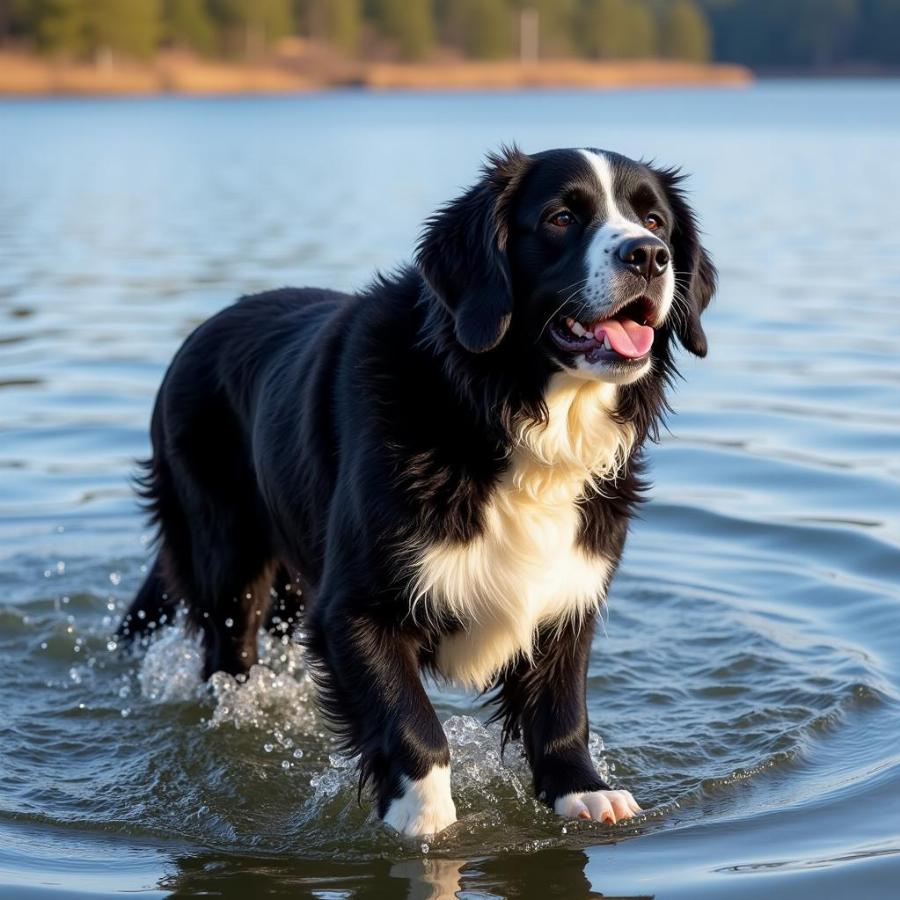The Newfoundland dog, with its impressive size and striking black and white coat, is a breed that commands attention. Often referred to as “gentle giants,” Newfoundland dogs, especially those with the classic black and white coloring, are known for their sweet temperament, loyalty, and love of family. If you’re considering welcoming a black and white Newfoundland dog into your life, this comprehensive guide will provide you with all the information you need to know.
Understanding the Black and White Newfoundland Dog
While the solid black Newfoundland is perhaps the most recognized, the black and white variation, known as a Landseer, holds a special place in the breed’s history. Named after the artist Sir Edwin Landseer who often featured them in his paintings, these Newfies boast a bold and beautiful coat pattern.
But beyond their stunning looks, black and white Newfoundland dogs share the same incredible characteristics as their solid-colored counterparts. They are intelligent, eager to please, and known for their gentle nature, making them wonderful companions for families with children.
Is a Black and White Newfoundland Dog Right for You?
Before you welcome any dog into your home, it’s crucial to consider if the breed’s needs align with your lifestyle. Newfoundland dogs, regardless of color, have specific requirements that potential owners need to be prepared for:
Size and Space Considerations:
Newfoundland dogs are large breed dogs. Males can weigh up to 150 pounds, and females up to 120 pounds. This considerable size means they need ample space to move around comfortably. While they can adapt to apartment living, a home with a fenced-in yard is ideal for these gentle giants.
Grooming Needs:
Their beautiful, water-resistant double coat requires regular grooming to prevent matting and tangles. Be prepared for weekly brushing, and more frequent grooming during shedding season.
Exercise Requirements:
Don’t let their laid-back demeanor fool you; Newfoundland dogs need regular exercise to stay healthy and happy. Daily walks, swimming (which they love!), and playtime are essential.
Training and Socialization:
Early training and socialization are crucial for any dog, but even more so for large breeds like the Newfoundland. Their intelligence makes them quick learners, and positive reinforcement methods work best.
Caring for Your Black and White Newfoundland Dog
Providing proper care for your black and white Newfoundland is key to ensuring a long and happy life for your furry friend.
Diet and Nutrition:
Feeding your Newfoundland a high-quality diet formulated for large breed dogs is essential. Consult with your veterinarian to determine the appropriate amount of food based on your dog’s age, activity level, and overall health.
Health Considerations:
Like all breeds, Newfoundland dogs are prone to certain health conditions, including hip and elbow dysplasia, bloat, and certain types of cancer. Regular veterinary check-ups, vaccinations, and preventative care are crucial.
 Black and White Newfoundland Enjoying a Swim
Black and White Newfoundland Enjoying a Swim
Mental Enrichment:
Newfoundlands are intelligent dogs that thrive on mental stimulation. Provide them with puzzle toys, interactive games, and opportunities to use their natural skills, such as retrieving.
The Joys of Owning a Black and White Newfoundland
Owning a black and white Newfoundland dog is a truly rewarding experience. They are incredibly loving and affectionate companions, known for their gentle nature and patience with children. Their loyalty is unwavering, and they form deep bonds with their families. While they may require a bit more care than some breeds, the love and companionship they offer make it all worthwhile.
FAQs about Black and White Newfoundland Dogs
Here are some frequently asked questions about black and white Newfoundland dogs:
Q: Do black and white Newfoundland dogs have different temperaments than solid black Newfoundlands?
A: No, the coat color does not affect their temperament. Both black and white and solid black Newfoundlands share the same gentle and loving personality.
Q: Are black and white Newfoundland dogs recognized by the American Kennel Club?
A: While the black and white variety is known as the Landseer, the AKC considers them a variation of the Newfoundland breed, not a separate breed.
Q: Do black and white Newfoundland dogs shed a lot?
A: Yes, they are heavy shedders, especially during shedding season. Regular brushing is a must to manage their thick double coat.
Q: Are black and white Newfoundland dogs good with other pets?
A: Yes, with proper socialization, they typically get along well with other dogs and pets.
Q: How long do black and white Newfoundland dogs live?
A: The average lifespan of a Newfoundland dog is 8-10 years.
Looking for More Furry Information?
Interested in learning about other biggest fluffy dog breeds? Perhaps you’re curious about the unique blend of a newfoundland dog mixed with a bernese mountain dog? Or maybe you’re drawn to the charm of a spotted black and white dog? Explore our website for more fascinating insights into the world of dogs.
Beaut Dogs: Your Trusted Source for Dog Lovers
Beaut Dogs is your go-to resource for everything related to dog breeds, care, and well-being. We’re dedicated to providing you with reliable and insightful information to help you provide the best possible care for your canine companion. If you have any questions or need further assistance, don’t hesitate to reach out to our team at [email protected]. We’re here to support you on your journey as a dog owner.